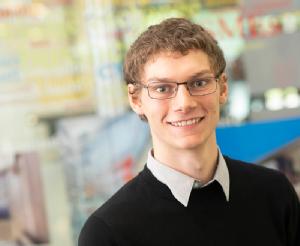WMG News
Death of Professor Lord Bhattacharyya
 It is with the deepest regret that we report that Professor Lord Bhattacharyya, Chairman of WMG at the University of Warwick, passed away on Friday 1st March after a short illness. His passing was peaceful and he was with his family, who are in our thoughts and prayers.
It is with the deepest regret that we report that Professor Lord Bhattacharyya, Chairman of WMG at the University of Warwick, passed away on Friday 1st March after a short illness. His passing was peaceful and he was with his family, who are in our thoughts and prayers.
Sir David Normington, Chair of Council and Pro-Chancellor of University of Warwick said:
“Long before I joined the University of Warwick Council, I knew of Professor Lord Bhattacharyya as an adviser to successive Prime Ministers and Secretaries of State and a tireless advocate for UK manufacturing industry. Then, as Chair of Council I had the great good fortune to see close up his extraordinary commitment to University of Warwick, to Coventry and the West Midlands and to UK plc.
“He was a force of nature. He pushed at boundaries, he changed lives, he created jobs, and he set the standard for how universities should work with industry. Most of all, for so many of us, he was also a kind and generous friend. We shall miss him terribly but here at Warwick he will remain our inspiration for many years to come.
“We send our love and deep condolences to Bridie and his family.”
Warwick’s Vice-Chancellor Professor Stuart Croft said:
“Professor Lord Bhattacharyya served for four decades at Warwick founding and leading WMG. However his service goes far beyond this University. The achievements of WMG, particularly his own wisdom, passion, and advocacy of the importance of manufacturing, technology, research teaching, and training has helped guide regional, national and international leaders, business figures and policy makers. He has helped preserve and create jobs and transform companies, economies, and individual lives, above all in our region. We mourn the passing of a unique man but we also celebrate all that he has achieved and are thankful that those achievements will have a massive impact for years to come.”
The University will post a longer tribute to his life and achievements in the coming days. Professor Lord Bhattacharyya's life touched so many people who we know will want to show their respects and commemorate his life and achievements. We therefore envisage that there will be a memorial event in due course and we publish the arrangements when they are available.
It was Professor Lord Bhattacharyya’s wish that the University ask Professor David Mullins to become the Acting Head of WMG and he has accepted that role. Professor Mullins said:
“It has been a great honour and privilege to have worked so closely with Professor Lord Bhattacharyya for over 20 years. At this sad time, we are all focused on growing the amazing organisation for research, education and impact that he created for national and international benefit.”
Universities of Warwick and Birmingham partner to boost West Midlands economy
Ways to reduce social inequality in the West Midlands and boost productivity will be researched thanks to an £800,000 research project, led by Warwick Business School with WMG at the University of Warwick, and City-REDI at the University of Birmingham.
WMG and Warwick Business School from the University of Warwick and City-REDI at the University of Birmingham will examine the factors that constrain firm-level innovation and productivity across the region, with a particular focus on the role of skills shortages, the importance of supply chains and impacts of foreign direct investment.
They will also work in collaboration with regional stakeholders, including the West Midlands Combined Authority, the Midlands Engine, five Local Enterprise Partnerships and private sector firms including Jaguar Land Rover and Aston Martin. More widely, the project will connect with the CBI - building on their recent productivity work- the Chambers of Commerce, TUC and Unite.
As well as contributing to the local industrial strategy the research team will examine trade-offs between policies and practices which target improvements in productivity against other development goals.
In particular, understanding how productivity improvements and related policies can contribute to inclusive growth which reduces inequalities within and across regions, or heighten such inequalities is a central aim of the research.
Professor Nigel Driffield, the leader of the project from WBS, University of Warwick said:

“This is an exciting project that will look to feed into the region’s industrial strategy. The West Midlands is known as the manufacturing hub of the UK, but it needs to build on this reputation, attracting more investment and more jobs to the area, particularly with the threat of Brexit looming.
"This project has three stands: researching regional Differences, skills and inclusive growth, plus investigating investment decisions, foreign investment and trade; and finally evaluating analytics enabled supply chains and operational productivity.”
Professor Janet Godsell of WMG, University of Warwick comments:

“For over 25 years it has been recognised that supply chains compete and not individual companies, but the focus has remained on company productivity.
"This project provides an opportunity to create a step change in productivity, by working with end-to-end supply chains supporting the regions automotive and infrastructure sectors, to improve end-to-end supply chain productivity.”
Director of City-REDI and project lead for Birmingham, Professor Simon Collinson, said:
“I am very pleased to be working with our partners at Warwick University on a project that is so critical to the future economic well-being of the region. The UK lags behind other countries in terms of average productivity and the West Midlands lags behind the UK average.
"But we cannot focus on productivity in isolation of other challenges. By contributing to a reduction in social inequality, alongside promoting economic growth, we are continuing the legacy of the University of Birmingham as a long-standing anchor institution in the Birmingham city-region.”
Professor Anne Green from City-REDI said:
“The foci of the research at City-REDI on skills and inclusive growth issues is in line with key concerns with regional policy makers.”
Primary school children build electric racing cars with help from WMG Warwick
Primary school children from three TSSMAT (The Small Schools Multi-Academy Trust) schools from Staffordshire will be building and racing their own Greenpower Formula Goblin electric cars with support from WMG at the University of Warwick. All three schools will compete at a national Greenpower race-day event in June.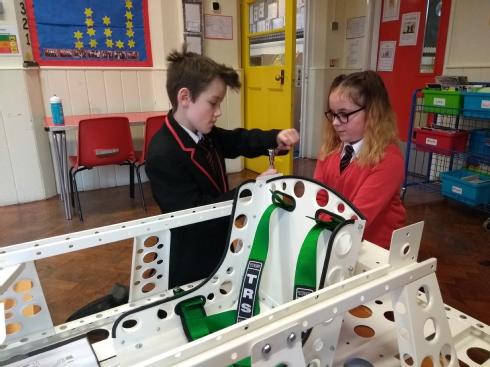
Children in years 5 and 6 at The Howard Primary School in Elford and St Mary’s CofE Primary in Colton will join pupils at The Richard Crosse School in Kings Bromley in this challenge, building on the successful launch of the initiative at Richard Crosse in 2018.
The children, aged 9-11, began assembling their cars from a kit of parts received back in January. When the kit is complete they will design and construct bespoke bodywork for their cars before moving on to driver training in the school playgrounds to ensure they are fully prepared for race day in the summer term.
The project embodies key practical engineering skills, working together as a team, and writing up their progress in their individual project portfolios to earn Greenpower STEM (Science Technology Engineering and Mathematics) awards from the AQA examination board.
Each school team also produces regular video diary updates to share their progress online with peers, siblings, parents and the wider community. Their Twitter handles are @StMarysRacing, @TheHowardRacing and @RCrosseRacing.
Formula Goblin is one of a series of age-graded motor-racing challenges set up by the Greenpower Education Trust to address the skills gap that is growing in the UK automotive industry. It is designed to engage students with maths, science and design technology, at early age and promoting equality and team working regardless of economic background or gender. The project aims to raise pupils’ awareness and enjoyment of STEM subjects and inspire them to consider STEM careers in their future.
This year TSSMAT wanted to expand the project across more of their schools to create a larger local community of budding young engineers. The project is funded by the UK Advanced Propulsion Centre, a government body established to support and promote the development of next generation automotive technology here in the UK. Direct support for the schools is delivered by WMG at The University of Warwick who are a member of the APC’s higher-education spoke community.
Dr Antony Allen from WMG who will be working closely with the schools comments:
“It’s fantastic to expand this project to two more schools within TSSMAT. One of the best aspects of my role here at WMG is the wonderful experience of working with future engineers of all ages, from my post-graduate Warwick automotive students through to excited year 5 and 6 pupils at our local primary schools. It’s a very rewarding experience for everyone involved”
Executive head teacher of the trust, Mr Paul Lovern, comments:
“I am thrilled that once again, The Small Schools Multi Academy Trust is involved in the Greenpower initiative.
“The children at all three schools have been inspired to take part and develop their engineering skills. This project embraces so many areas of the curriculum and demonstrates a curriculum that is enriching, at its best! I hope that from the ‘green shoots’ that are emerging, the children are inspired to become engineers of the future.
“I look forward to Race Day, however I will have to remain very neutral with regards to who becomes the overall winning school!”
Smarter, greener, cleaner steel: £35 million boost for research to transform UK steel industry
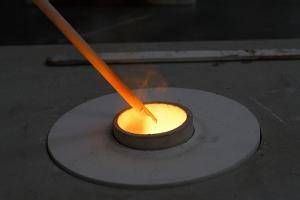 A smart, green and clean steel industry will come a giant step closer thanks to a new £35 million research network, announced today, which will see steelmakers and University experts work together on a seven-year research programme to transform the UK steel sector.
A smart, green and clean steel industry will come a giant step closer thanks to a new £35 million research network, announced today, which will see steelmakers and University experts work together on a seven-year research programme to transform the UK steel sector.
The network, called SUSTAIN, is to transform the whole steel supply chain, making it cleaner, greener and smarter, and more responsive to the fast-changing needs of customers. Its work will be concentrated on two areas:
· Zero waste iron and steelmaking, with the aim of making the industry carbon-neutral by 2040: Steel is already the world’s most recycled material, but the network will investigate new ways of making the industry’s processes and products even greener, such as harvesting untapped energy sources, capturing carbon emissions and re-processing societal and industrial waste streams.
· Smart steel processing: like any 21st century industry, steelmaking involves masses of data. SUSTAIN will develop new ways of acquiring and using this data to improve the steels produced as well as in new metallurgical processes, which can deliver bespoke high tech products.
Steel is the most widely-used structural material in the world. If a product isn’t made of steel it’s made using steel. Steel is at the heart of UK manufacturing sectors such as the car industry, construction, packaging and defence. It is an indispensable component of the UK’s future national infrastructure such as transport, communications and energy, and for high-tech 21st century industries, from energy-positive buildings to wind turbines and electric vehicles.
The work of SUSTAIN is projected to:
- Double UK steel manufacturers’ gross value added (GVA) by 2030
- Boost jobs in the industry to 35,000
- Increase productivity by 15%
SUSTAIN involves more than twenty partners across the UK steel industry: companies, trade bodies, research organisations and academic experts including WMG, University of Warwick. The network is being supported by £12.5M investment from the Engineering and Physical Sciences Research Council, as one of their Future Manufacturing Research Hubs, along with significant investment from the steel companies within the UK.
The announcement is a landmark as it is the first time that UK steel producers and representatives from the manufacturing sector have lined up behind a co-ordinated programme of research. It is also the largest ever single investment in steel research by a UK research council.
The plan is that SUSTAIN will be a seed from which much wider research and innovation will grow, drawing on expertise across UK academia and beyond.
Professor Claire Davis, from WMG, University of Warwick comments: “The UK has a rich tradition of research excellence and innovation in steel metallurgy. SUSTAIN will bring together leading research groups in this area, as well as introducing new expertise in big data and supply chain innovation, to work collaboratively with the UK industry.
The network will be able to tackle the large issues facing the steel industry, particularly in becoming low energy, carbon neutral, dynamic and responsive to customer needs. It is an exciting time to be working on steel as there are opportunities to contribute to making the planet a greener place.”
Dr Cameron Pleydell-Pearce, steel expert at Swansea University and SUSTAIN’s deputy director, said: “This news is a massive vote of confidence in the steel industry. It will support the industry’s vision for a responsible, innovative and creative future. We are already on the road to clean, green and smart steelmaking, but this is another giant step forward.
Research and innovation are the bedrock of a modern steel industry. This network represents almost the whole UK steel sector, with researchers and companies working together on an unprecedented scale. Here in Swansea we’re proud to lead it.”
Gareth Stace, UK Steel Director General, said: "This new boost of innovation funding into the sector is a vital piece of the puzzle to help deliver our vision of a cutting-edge, vibrant, and sustainable steel industry in the UK.
The future success of our sector rests on our ability to remain at the forefront of product and process innovation, delivering the new steel products demanded by our customers and society. This new hub will enable us to do just that.”
Grad job applications now open for WMG
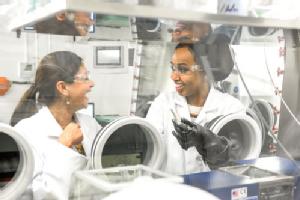 Grad jobs are now being advertised at WMG, University of Warwick. There are 13 jobs available starting September 2019, which will be working on projects such as Automation Systems, Energy Innovation and Smart Connected and Autonomous Vehicles.
Grad jobs are now being advertised at WMG, University of Warwick. There are 13 jobs available starting September 2019, which will be working on projects such as Automation Systems, Energy Innovation and Smart Connected and Autonomous Vehicles.
The closing date to apply is the 15th March 2019.
Following the successful launch of the WMG Graduate Development Programme last year, WMG has launched recruitment for its 2019 graduate programme, with 13 places available to graduates from all Higher Education Institutes.
The programme is designed for aspiring engineers and follows three pathways – Automation Systems, Energy Innovation and Smart Connected and Autonomous Vehicles. The Graduate Trainee’s will be working alongside academics, and industry partners.
Starting in September 2019, the programme will last for two years during which graduates will complete five/six different placements, each offering the opportunity to develop their engineering skills and knowledge in key areas, with the chance to apply these skills to real-world research and development.
On completion of the scheme, the graduates will be equipped with the skills to apply for roles such as a Project Engineer or Project Manager, or pave the way for future studies such as a Master’s or PhD.
 WMG Graduate Trainee Engineer Puja Unadkat joined the scheme following her graduation from the University of Warwick:
WMG Graduate Trainee Engineer Puja Unadkat joined the scheme following her graduation from the University of Warwick:
"There is so much support offered here, not just from your peers, but from your mentors and managers too. There are regular discussions on how you can develop and enhance your skills and knowledge to steer your career in your chosen direction. There is such a variety of opportunities offered, such as the chance to attend professional conferences, as well as gaining a project management qualification. Progression and development is at the heart of the organisations culture and it really shows.”
WMG Graduate Trainee Engineer Ben Ayre, also joined the scheme last year following his graduation from the University of Warwick.
“My highlights so far have included working on multi mullion pound projects with a variety of organisations to achieve real impact. I’ve also had the opportunity to undertake professional development courses and qualifications. It has also been great to have the support of the other graduates, making the transition between university and work life easier. I would advise anyone who is wants to work in a varied team working on lots of cutting edge projects to apply as it is an excellent scheme.”
Trainees benefit from a training salary of £26,243 a year.
You can find out more about the graduate development programme at our dedicated careers page www.warwick.ac.uk/WMGGraduateScheme
WMG Degree Apprenticeship Centre
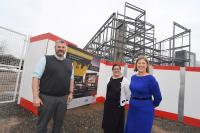 Work is on track for our new WMG Degree Apprenticeship Centre, at the University of Warwick, to equip young engineers with the high-level skills businesses need in the future.
Work is on track for our new WMG Degree Apprenticeship Centre, at the University of Warwick, to equip young engineers with the high-level skills businesses need in the future.
The WMG Degree Apprenticeship Centre was awarded £10 million funding from the Government’s Local Growth Fund through the Coventry and Warwickshire Local Enterprise Partnership (CWLEP).
The steel frames for the Centre are now in place in the first phase of creating the complex, which is scheduled to open in September this year.
The WMG Degree Apprenticeship Centre, at the University of Warwick, will provide apprentices with the opportunity to study on degree programmes to develop the skills needed by advanced engineering and manufacturing companies.
The Centre will run training programmes up to Master’s Degree level initially for 1,000 students, who will complete their studies at the University campus in conjunction with their employment at companies throughout Coventry and Warwickshire.
The Centre will feature flexible teaching and lab space, and an environment for technology-enhanced learning as well as provide advice and support to apprentices and organisations.
The WMG Degree Apprenticeship Centre is the first stage of a future Degree Apprenticeship complex at the campus to train students in a range of Degree Apprenticeships.
Minister for Local Growth, Jake Berry, said: “We’re committed to boosting economic growth across the Midlands Engine and whole of the UK and building a Britain fit for the future.
“The Government’s £10 million investment in the WMG Degree Apprenticeship Centre will give young people the cutting-edge engineering skills they need to secure high-value jobs and ensure advanced manufacturing companies have the qualified staff required to grow their business and competitiveness.This will help drive up the productivity of businesses in Coventry and Warwickshire and make a valuable contribution to delivering the Government’s Industrial Strategy.”
Professor Lord Bhattacharyya, Chairman of WMG, said: “The WMG Degree Apprenticeship Centre will provide the opportunity for apprentices to study whilst supporting our manufacturing base by learning the skills necessary for the UK to stay competitive.”
Jonathan Browning, chair of the CWLEP, said: “It is great to see the WMG Degree Apprenticeship Centre taking shape since this will be a valuable resource to train students with the skills which employers need to drive their businesses forward.
“The Local Growth Fund was established by the Government to give LEPs the opportunity to fund projects which will boost the economy, support businesses and create jobs.
“It is vital we equip apprentices with high-level skills and this centre will bring huge benefits to the advanced engineering and manufacturing sector in the area.”
Caption: From the left, Professor Steve Maggs (WMG, University of Warwick), Gemma Gathercole (CWLEP) and Marion Plant (CWLEP) at the WMG Degree Apprenticeship Centre
NOTES TO EDITORS
Local Growth Fund
Local Enterprise Partnerships are playing a vital role in driving forward economic growth across the country, helping to build a country that works for everyone.
That’s why by 2021 Government will have invested over £12bn through the Local Growth Fund, allowing LEPs to use their local knowledge to get all areas of the country firing on all cylinders.
Some additional key facts:
- There are 38 LEPs covering the whole of England
- The government has awarded £9.1bn in three rounds of Growth Deals to local areas to drive economic growth.
- LEPs are investing in a wide range of projects including transport, skills, business support, broadband, innovation and flood defences.
Midlands Engine
Some Midlands Engine key facts:
- The government is committed to making the Midlands an Engine for Growth in the UK, increasing economic growth and improving the quality of life for everyone. The Midlands is home to over 10 million people and over 780,000 businesses. Its economy is worth £217.7 billion.
- So far the government has awarded £1.9 billion in three rounds of Growth Deals across the Midlands.
WMG, University of Warwick
WMG is a world leading research and education group and an academic department of the University of Warwick, established by Professor Lord Kumar Bhattacharyya in 1980 in order to reinvigorate UK manufacturing through the application of cutting edge research and effective knowledge transfer.
WMG has pioneered an international model for working with industry, commerce and public sectors and holds a unique position between academia and industry. The Group’s strength is to provide companies with the opportunity to gain a competitive edge by understanding a company’s strategy and working in partnership with them to create, through multidisciplinary research, ground-breaking products, processes and services.
Every year WMG provides education and training to schoolchildren through to senior executives. There is a growing part-time undergraduate programme for apprentices, as well as full-time undergraduates. The postgraduate programmes have over 2,000 students, in the UK and through centres in China, India, Thailand, South Africa and Malaysia.
Sutton Scholars
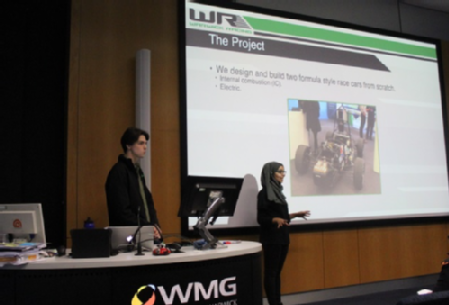 In January, as part of the Sutton Scholars project we invited a group of Year 8 students and their parents to the University. These are school students who show great academic potential, with the aim being to give them an early insight into university life by visiting campus and trying out new subjects.
In January, as part of the Sutton Scholars project we invited a group of Year 8 students and their parents to the University. These are school students who show great academic potential, with the aim being to give them an early insight into university life by visiting campus and trying out new subjects.
As part of the visit, the Warwick Racing student project team also delivered a presentation to the group to help raise awareness of engineering and give an insight into the team’s fascinating work.
WMG Academy named top sixth form in Coventry
 WMG Academy Coventry has been ranked as the top sixth form in Coventry, according to official school performance tables published this week.
WMG Academy Coventry has been ranked as the top sixth form in Coventry, according to official school performance tables published this week.
The academy's sixth form is number one out of 26 in the city, ahead of all state-funded and independent schools.
WMG Academy Coventry boasts the only sixth form in the city to be classed as 'well above average' in the Government's main sixth form measurement, Progress Score.
It is also the top non-fee paying sixth form for percentage of students achieving at least AAB at
A-level.
WMG Academy Coventry Principal Mr Matt Brady said: "We are thrilled to be recognised as number one in Coventry. It is testament to the hard work and commitment of our staff and students."
WMG Academy Coventry achieved a 100% pass rate at A-level and BTEC in 2018.
The academy in Mitchell Avenue opened in 2014 and is now the number one University Technical College in the UK for students moving on to higher and degree apprenticeships, with companies paying students' university tuition fees and a salary.
It is rated 'Good' by Ofsted across all categories and is partnered with the University of Warwick and businesses including Aston Martin, Bosch, National Grid, Severn Trent, Rolls-Royce, Meggitt, WMG and Jaguar Land Rover.
The closing date for sixth form applications for September 2019 entry is 31st January. Apply here
ENDS
For more information email c.lewis@wmgacademy.org.uk or call Calista Lewis on 024 7642 6896.
Notes to editors
WMG Academies offer world class education for students aged 14-19 who want to pursue a career in science, technology, engineering and maths. With the support of sponsoring companies, this approach prepares them for the challenges of the 21st century in companies, further education or at university.
Employer Partners for WMG Academy for Young Engineers include:
Aston Martin, Automotive Insulations, Bosch, Cummins, Dassault Systemes, DCS Group, Jaguar Land Rover, Meggitt, National Grid, Oleo, Prodrive, Ricardo, Sarginsons, Savery Hydraulics, SCC, Squires Gears, Sure Track, Tata Motors, University of Warwick , Vinci Energies, WMG.
WMG Academy for Young Engineers is currently accepting applications for students to start in September 2019.
Unfit people are more physically active because of the Sweatcoin app that pays you to walk
More people are physically active due to the Sweatcoin app which rewards you for walking – researchers at the Institute of Digital Healthcare, WMG at the University of Warwick have found. Sweatcoin gets people outdoors and walking to earn a virtual currency to spend in their marketplace.
Reaching your target number of steps a day is a little easier for those using the app called Sweatcoin which rewards users with a virtual currency for walking.
Sweatcoin works by converting the number of steps recorded on your phone into a virtual currency of Sweatcoins.
Every 1,000 steps generate 0.95 Sweatcoins and these can be used to purchase products on the in-app marketplace, (with prices ranging from 5 to 20,000 Sweatcoins), in local shops, or be transferred between other users.
Currently, steps recorded outdoors are rewarded due to the use of a GPS-based verification algorithm used to stop people cheating their phone’s step-counting algorithm.
The Institute of Digital Healthcare, WMG at the University of Warwick analysed daily step count data from 6000 users of the app, and found that there was a sustained average increase of nearly 20% in daily step count over a 6-month period after users had registered with the app, in comparison with a 3-month period prior to downloading the app.
Following a survey on a sample of the original 6000 users, those who were classified as less physically active and overweight were found to be most likely to increase their daily step count when using the app, meaning that Sweatcoin was having impact on an important section of the population who previously had low levels of physical activity.
 Dr Mark Elliott, Assistant Professor at the Institute of Digital Healthcare, WMG - University of Warwick comments:
Dr Mark Elliott, Assistant Professor at the Institute of Digital Healthcare, WMG - University of Warwick comments:
“We were delighted to have the opportunity to work with Sweatcoin and investigate how their app impacts on physical activity behaviour change. By analysing the daily step count data from a sample of Sweatcoin users and combining this with data from the surveys and focus groups facilitated by our researchers, we were able to identify which types of user had shown the biggest change in terms of increased physical activity from using the app.”
Anton Derlyatka co-founder at Sweatcoin comments:
"Incentivising people to walk more is key to improving levels of sustained physical activity. Yet, traditional ideas such as providing educational seminars or discounted gym passes, just don’t deliver. The University of Warwick found that an economy built on movement, as created by Sweatcoin, establishes sustained motivation for people to be more active. For an increasingly sedentary population facing an obesity and wellness crisis, these are significant findings.”
Lord Philip Hunt, Sweatcoin Advisory board member commented:
“Most health apps and initiatives tend to be aimed at those who are already active. Sweatcoin has huge potential in encouraging and incentivising non-active people to get walking. Given the health gains that can be achieved through increased physical activity, this is the kind of breakthrough we need to help motivate who can benefit most.”
WMG and GEFCO to revolutionise automotive battery supply chain
A new innovation hub is being launched at WMG in partnership with GEFCO today. The Hub will focus on cutting edge research into the future of automotive supply chains, the dual challenges of electrification and using and reusing resources for as long as possible.
The hub is closely linked to the EPSRC(Engineering and Physical Sciences Research Council) Sustainable Materials and Manufacturing Centre for Doctoral Training at the University of Warwick.
The first two projects will research new circular business models for the supply, refurbishment and re-use of batteries for the electric automotive supply chain, and the use of new technologies to design fully-traceable and re-usable packaging.
A third project will examine the opportunities for logistics service providers to expand their business models to offer supply chain finance complimentary to out-sourcing of material and information flows.
 Professor Janet Godsell, from the Supply Chain Research Group, WMG, University of Warwick will head up the new hub, she comments: “Digital technology provides an opportunity to re-think the way in which we do business, and blurs the traditional distinction between manufacturing and logistics. A distinction further blurred as we seek to develop new business models that more holistically consider reuse, repair, remanufacture and recycling.”
Professor Janet Godsell, from the Supply Chain Research Group, WMG, University of Warwick will head up the new hub, she comments: “Digital technology provides an opportunity to re-think the way in which we do business, and blurs the traditional distinction between manufacturing and logistics. A distinction further blurred as we seek to develop new business models that more holistically consider reuse, repair, remanufacture and recycling.”
Helen Grover, Human Resources Director at GEFCO UK comments:
“We are delighted to work with GEFCO to launch their Supply Chain Innovation Hub at WMG, University of Warwick. This £180k investment will support GEFCO to provide leading edge digital supply chain solutions that meet their customer needs in a cost effective and sustainable way.
“We are looking forward to working with WMG, University of Warwick because it allows us to be involved with cutting edge research and puts us at the forefront of the future of sustainable manufacture and logistics. The partnership sits perfectly with our company ethos of always seeking new innovative solutions to maintain our growth and to improve the way our industry works”.
ENDS
About GEFCO
At GEFCO, we believe long-lasting cooperation with partners is the key to shared growth. Building on 69 years of expertise and a strong heritage in the automotive industry, we design smart, flexible solutions for complex supply chains. Today, the GEFCO Group is the European leader in automotive logistics, and a top 10 global partner in multimodal supply chain solutions.
The Group is present in 47 countries, includes over 300 destinations in its current network and employs 13,000 people globally. GEFCO reported a turnover of €4.4 billion in 2017.
GEFCO has been present in the UK since 1981. With headquarters located in Coventry, GEFCO UK employs 600 people in 18 sites. https://uk.gefco.net/
Website: www.gefco.net; Twitter: @GEFCO_Group

